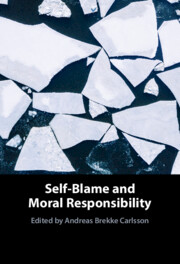Book contents
- Self-Blame and Moral Responsibility
- Self-Blame and Moral Responsibility
- Copyright page
- Contents
- Contributors
- Acknowledgments
- Introduction
- Part I The Nature of Self-Blame
- Chapter 1 The Motivational Theory of Guilt (and Its Implications for Responsibility)
- Chapter 2 The Trials and Tribulations of Tom Brady
- Chapter 3 A Comprehensive Account of Blame
- Chapter 4 A Forward-Looking Account of Self-Blame
- Part II The Ethics of Self-Blame
- Part III Self-Blame and Moral Responsibility
- References
- Index
Chapter 3 - A Comprehensive Account of Blame
Self-Blame, Non-Moral Blame, and Blame for the Non-Voluntary
from Part I - The Nature of Self-Blame
Published online by Cambridge University Press: 05 May 2022
- Self-Blame and Moral Responsibility
- Self-Blame and Moral Responsibility
- Copyright page
- Contents
- Contributors
- Acknowledgments
- Introduction
- Part I The Nature of Self-Blame
- Chapter 1 The Motivational Theory of Guilt (and Its Implications for Responsibility)
- Chapter 2 The Trials and Tribulations of Tom Brady
- Chapter 3 A Comprehensive Account of Blame
- Chapter 4 A Forward-Looking Account of Self-Blame
- Part II The Ethics of Self-Blame
- Part III Self-Blame and Moral Responsibility
- References
- Index
Summary
Blame is multifarious. It can be passionate or dispassionate. It can be expressed or kept private. We blame both the living and the dead. And we blame ourselves as well as others. What’s more, we blame ourselves, not only for our moral failings, but also for our non-moral failings: for our aesthetic bad taste, gustatory self-indulgence, or poor athletic performance. And we blame ourselves both for things over which we exerted agential control (e.g., our voluntary acts) and for things over which we lacked such control (e.g., our desires, beliefs, and intentions). I argue that, despite this manifest diversity in our blaming practices, it’s possible to provide a comprehensive account of blame. Indeed, I propose a set of necessary and sufficient conditions that aims to specify blame’s extension in terms of its constitution as opposed to its function. And I argue that this proposal has a number of advantages beyond accounting for blame in all its disparate forms.
- Type
- Chapter
- Information
- Self-Blame and Moral Responsibility , pp. 48 - 76Publisher: Cambridge University PressPrint publication year: 2022
- 13
- Cited by

